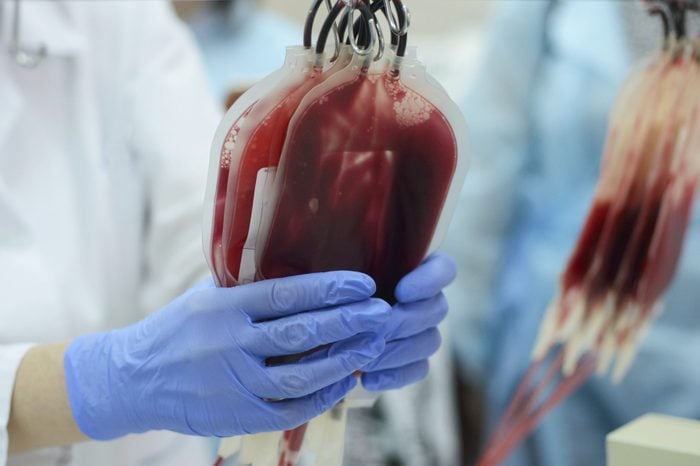
Can I donate blood?
Donating blood is one way to help the greater community—and this is especially true in the era of the coronavirus pandemic and COVID-19. In fact, donor plasma from people who’ve recovered from COVID-19 could help experts with lifesaving treatment. In addition to the current health crisis, there are plenty of reasons for other people to donate blood—and some surprising benefits, too. The U.S. Food and Drug Administration (FDA) recently revised its blood donation guidelines and changed the deferral or wait period for donations in the wake of COVID-19. Read more to learn how long you may have to wait to donate blood and reasons why you might not be able to donate.

The medications you’re taking
Most medications won’t disqualify you from being able to donate blood, but some may require a waiting period after your final dose. “If you’re taking an antibiotic for an infection, you may be asked to wait until you’re healthy again; if you’re taking aspirin and donating platelets, you must wait two full days after taking aspirin or any medication containing aspirin before donating,” says John R. Hackett, Jr, PhD, divisional vice president of applied research and technology for Abbott. When you go donate, make sure you have an updated medication list with you.
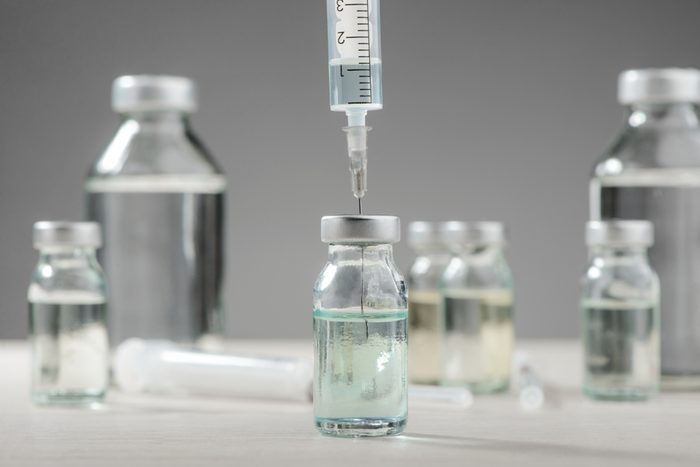
You’ve recently been vaccinated
This doesn’t apply to common vaccinations such as those for the flu or HPV (the Gardasil vaccine). However, says Thomas Hirose, MD, Medical Director for Transfusion Services and Blood Donor Center at MemorialCare Saddleback Medical Center in Laguna Hills, California, some vaccinations may contain live infectious agents. “A person who has been exposed to a live infectious agent in a vaccination should not donate for a specified period of time,” he says. For example, you should wait anywhere from 14 days to eight weeks to donate after being vaccinated, but it depends on the type of vaccine, according to the American Red Cross. Talk to your doctor or donation center about how long you should wait. This is the rarest blood type in the world.

You got a tattoo from an un-regulated shop
Not all states enforce tattooing standards such as requiring proper needle sterilization and prohibiting the reuse of ink. If you got a tattoo in a state that does not regulate facilities, you have to wait three months before donating. You could transmit a viral infection if you don’t wait, explains Dr. Hackett. “Currently, the states that do not regulate tattoo facilities are District of Columbia, Georgia, Idaho, Maryland, Massachusetts, Nevada, New Hampshire, New York, Pennsylvania, Utah, and Wyoming,” he says.
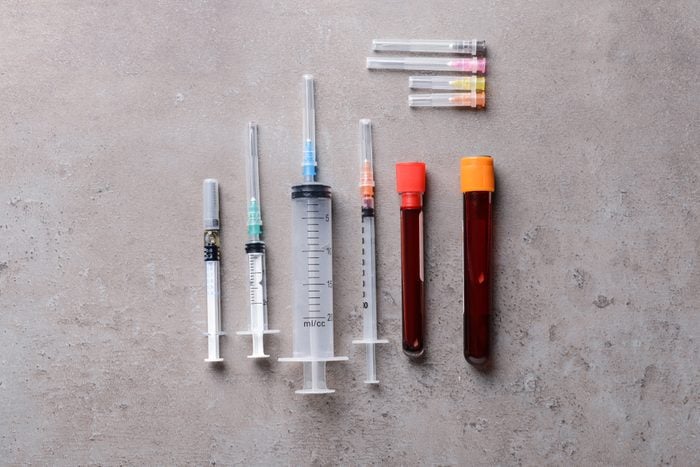
You’ve tested positive for hepatitis or HIV
Since HIV and hepatitis can be transmitted through blood, you cannot donate if you’ve tested positive for either condition. “Because some types of hepatitis may not be treatable and can lead to fatal health problems, such as liver failure and liver cancer, it is too risky to donate blood if you have these diseases,” says Ehsan Ali, MD, a Beverly Hills concierge doctor.

You’ve recently traveled outside the United States
As part of the registration process, blood center staff will ask whether or not you’ve traveled abroad recently—you could have picked up blood-borne or communicable infections, explains Dr. Hackett. “For example, in the past three years, if you’ve been to an area at risk for malaria, you may have to wait a certain length of time before you can give blood. If you’ve spent extended periods of time in countries where ‘mad cow disease’ is found, you may not be eligible to donate,” he says. To make the process easier, he recommends making a list of where you’ve been outside the United States or Canada in the last three years, including which dates you were there, how long you stayed, what mode of transportation you used, and if you left the city or resort at any time. For people who have traveled to countries where malaria is endemic, the recommended deferral period is three months, per the FDA. Check out the reasons why everyone should know their blood type.
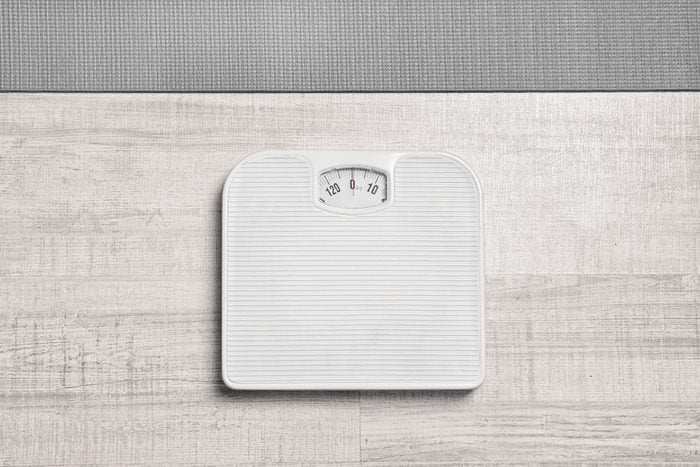
You’re underweight
If you weigh less than 110 pounds, you’re not eligible to donate blood. “Underweight individuals tend to have low blood volumes and therefore may not tolerate the removal of the required volume of blood,” explains chiropractor Lev Kalika, owner of New York Dynamic Neuromuscular Rehabilitation & Physical Therapy in New York City.

You’re feeling under the weather or have recently been sick
If you’re not feeling well on the day of your donation—whether it’s a cold, sore throat, or a terrible headache—it’s best to reschedule. You’ll want to wait for at least 48 hours after your symptoms have cleared up. “You want to be in good health when you give blood,” says Dr. Hackett. However: “Don’t let allergies keep you away! As long as you’re breathing fine, feeling well and don’t have a fever, you have the green light to donate.”

Your iron levels are too low or too high
Having low iron—less than 12.5g/dL for women and 13.0g/dL for men—will disqualify you from donating. For this reason, frequent donors, especially women, are encouraged to take iron supplements and eat iron-rich foods to keep their levels in the normal range. Just keep an eye on your iron though—having levels that are too high will also disqualify you from blood donation. “High blood iron levels increase the risk of heart disease, heart attack, stroke, certain cancers, and other serious health issues,” says Dr. Hirose. “If you have a hemoglobin level above 18 gm/dL you should be referred to your physician for evaluation.” Check out the secrets your blood type reveals about you.

You’re a male who has sex with other males
If you are a man who has had sexual intercourse with another man, you must wait three months from your last sexual contact before donating blood, per the FDA. “Due to the risk of sexually transmitted diseases, such as HIV, the guidelines are set to prevent any potential transmission of those diseases to others,” Dr. Ali says.

You’ve had cancer
While the risk of getting cancer through blood donation is negligible or even non-existent, Kumar Dharmarajan, MD, geriatrician and Chief Scientific Officer of Clover Health, points out that there are still a few common rules for donors with cancer that are designed to protect the recipient. “Notably, you cannot donate if you are being treated for cancer, your cancer is spreading or has come back, you’ve had cancers of the blood, such as leukemia or lymphoma as an adult (including Hodgkin’s Disease), and if you’ve ever had Kaposi sarcoma,” he says.

You’re pregnant
Even though you have more blood circulating through your body during pregnancy than when you’re not pregnant, expecting women must wait a minimum of six weeks after giving birth to give blood. “You want to make sure you’re as healthy as possible during your pregnancy,” says Dr. Hackett. “Consider consulting your healthcare provider about taking multivitamins with 18 mg of iron to make sure you can donate when eligible again.”

You recently got a piercing or electrolysis
If you’ve recently gotten an ear or body piercing or electrolysis with a reusable gun or reusable instrument, you’ll have to wait three months before you can give blood, according to the FDA. “Like getting a tattoo, you won’t have to wait if the instruments used were single-use equipment,” Dr. Hackett says. Before you get a piercing or electrolysis, he recommends doing your research on whether the place employs single-use equipment.
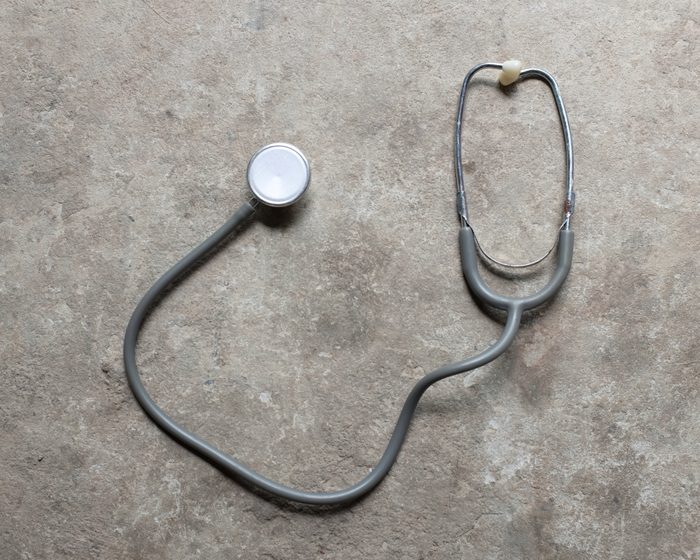
You’ve recently had syphilis
If you have had syphilis, you must wait 12 months after treatment before you can donate blood. “Syphilis is an infection that can spread throughout the entire body,” explains Dr. Ali. “Despite receiving treatment, there are times when one may need to be re-treated.” What’s more, he points out that syphilis can cause permanent health problems. Find out 13 more things you should know before donating blood.

You lived in the UK between 1980 and 1996
During the 80s and 90s, an outbreak of “mad cow disease,” also known as bovine spongiform encephalopathy (BSE) targeted cows in the United Kingdom. This neurodegenerative disease seems to be caused by an unusual protein called a prion, reports the Centers for Disease Control and Prevention; prions can be transmitted to people should they eat diseased animals, which can cause the human form of the disease known as variant Creutzfeldt-Jakob disease (vCJD). In late 1994 in the UK, people began showing symptoms, including muscle stiffness, changes in personality, dementia, and seizures. A small number of vCJD cases were traced to blood transfusions from infected donors. As a result, individuals who visited or lived in the United Kingdom for longer than three months between January 1, 1980 and December 31, 1996, or anyone who received a blood transfusion in either the UK or France from January 1, 1980 to the present are not allowed to give blood, according to the Red Cross.
